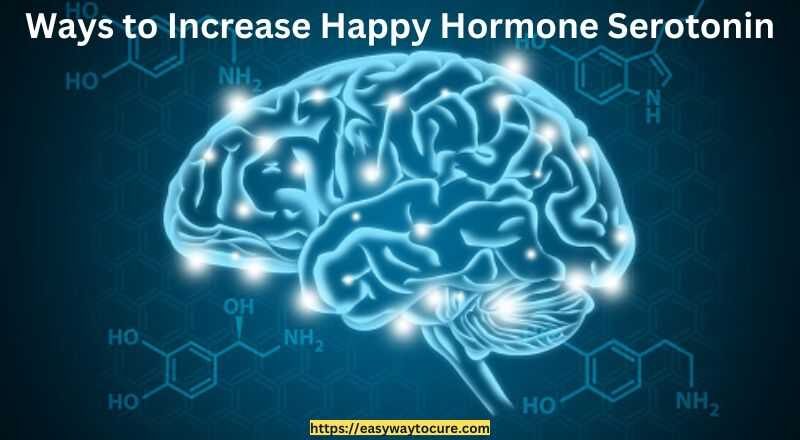Serotonin is a neurochemical produced by your body that makes you feel cheery, happy, and content. Serotonin helps you focus, stay calm, and pay attention by keeping your mood constant. Also, it can keep your bones healthy.
Unfortunately, you can have stress and irritability as a result of low serotonin. Many people have low serotonin levels, which can make them feel irritable, worried, and anxious. They are also susceptible to panic attacks, obsessive-compulsive disorder, and suicidal thoughts.
Impulsive cravings and low serotonin levels might also make you seek quick highs from junk food, binge eating, drunkenness, or drug usage. Sleeping disorders can also affect your sleeping patterns, causing oversleeping or frequent waking up during the night. IBS and serotonin both help to maintain regular digestion, therefore a lack of either may result in irritable bowel syndrome or persistent diarrhea and shivering. Fortunately, there are some simple and natural methods for increasing happy hormone serotonin levels.
Lack of Sunlight

Many individuals feel gloomy, unhappy, and melancholy in the winter because they don’t get enough sunlight. This explains why Iceland has a greater incidence of depression where they may get around 4 hours of daylight in the winter because of the country’s high latitude. When sunlight reaches your eyes, it activates areas of your retina, signaling your brain to produce and store more serotonin. When UV rays strike your skin, they stimulate the formation of Vitamin D, which lowers stress hormones (cortisol) and increases happy hormones (serotonin).
This is why sunbathing on a beautiful beach makes individuals feel a lot better, calmer, and happier. Start taking gentle walks outside for at least 45 minutes every day, especially if there is cloud cover. The essential oils generated by plants and trees have a relaxing impact and can assist to balance your nervous system.
Read Also: How to Reverse the Aging Process?
Prebiotics and Prebiotic Foods

EC Cells in your gut produce 95% of the serotonin in your body. You need a lot of friendly bacteria and other healthy germs in your digestive tract to activate these EC cells. Unfortunately, junk foods, drugs, artificial sweeteners, and stress can all promote bacterial imbalances, leading to depression, anxiety, and mood disorders. It is referred to as the gut-brain connection. To keep your brain chemistry in balance, bacteria in your gut generate neurotransmitters such as serotonin, gaba, and dopamine.
Fortunately, consuming prebiotic and probiotic-rich foods is a simple way to repair your microbiota. Sauerkraut, kefir, miso, pickled cucumber, raw milk cheese, and kimchi are all suggestions. To increase serotonin levels, eat meals high in oligosaccharides, a type of plant sugar that nourishes certain microorganisms in your stomach and stimulates EC cells to produce more serotonin. The richest sources of this prebiotic are chicory root and Jerusalem artichokes. It is also found in asparagus, onions, garlic, leeks, berries, and melons.
Read Also: 14 Best Foods for Nervous System
Daily Workout

Begin doing at least 30 minutes of cardiovascular exercise twice a week, such as jogging, biking, swimming, walking, squats, step aerobics, or anything else that gets your heart rate up. According to research, motor activity increases the brain’s ability to convert tryptophan into serotonin, hence increasing serotonin levels. This is why exercise is usually recommended for anyone suffering from mental health issues. Exercise also activates reward areas in your brain by increasing dopamine levels, making you feel more pleasurable and less depressed/anxious.
Quit Snacking

When you snack regularly during the day, you elevate the level of a hormone called insulin, which aids in the control of your blood sugars. However, years of snacking cause insulin resistance. This prevents the hormone from carrying nutrients like tryptophan to your brain. This might result in low serotonin levels and blood sugar changes, causing your mood to swing up and down.
So, instead of nibbling, try eating two full meals per day. Increasing the amount of good, nutritious veggies, proteins, and fats in your diet can assist balance your hormones and neurotransmitters.
Read Also: Amazing Health Benefits of Dates
Stress Management

As part of the fight/flight reaction, your adrenal glands release a hormone called cortisol whenever you are stressed or anxious. Cortisol and serotonin work together to keep you aware and ready to escape/fight in a life-threatening emergency. Too much cortisol, on the other hand, reduces serotonin over time, eventually causing a chemical imbalance in the brain. So begin taking actions to reduce your stress, like meditation, yoga, and reading. C, consider getting a massage once or twice a week to reduce cortisol and increase serotonin. Long walks can help relieve tension, as can sipping herbal teas like passionflower and avoiding caffeine and stimulants. It’s crucial to control your feelings.
Improve Your Sleep

Getting more sleep is the most effective strategy to reduce stress (cortisol) and feel calmer, more focused, and happier (serotonin). Begin going to bed an hour early and allowing yourself time to relax before falling asleep. Turn off your devices and block off as much light as possible. Make an effort to stick to a regular bedtime and wake-up time every day. This will assist in synchronizing your body’s internal clock (circadian rhythm) and regulating the quantity of serotonin stored and used by your brain.
Read Also: How to Overcome Terminal Insomnia
Recall Pleasant Events

According to studies, those who spend more time recalling specific and positive memories have reduced incidences of depression. This causes the production of endorphins and other beneficial brain chemicals, which boost your mood and help control serotonin/cortisol levels. Having a conversation with old friends can help you to feel happy and to recall the old days. Writing a journal about happy moments and rereading them is the best way.
So, in summation, these are the 7 things you can do to increase the happy hormone serotonin. SUMMARY 1. Get more sunlight (45m+) every day. 2. Foods high in probiotics and Prebiotics 3. Work out (30m) twice a week. 4. Reduce snacking (to improve insulin sensitivity) (to help tryptophan and fuel cross into your brain) 5. Stress Management (by getting a massage or drinking passionflower tea) 6. Improve your sleep by retiring to bed at regular intervals and turning off all electronics and light sources. 7. Keep a journal and write down positive memories from your life.
